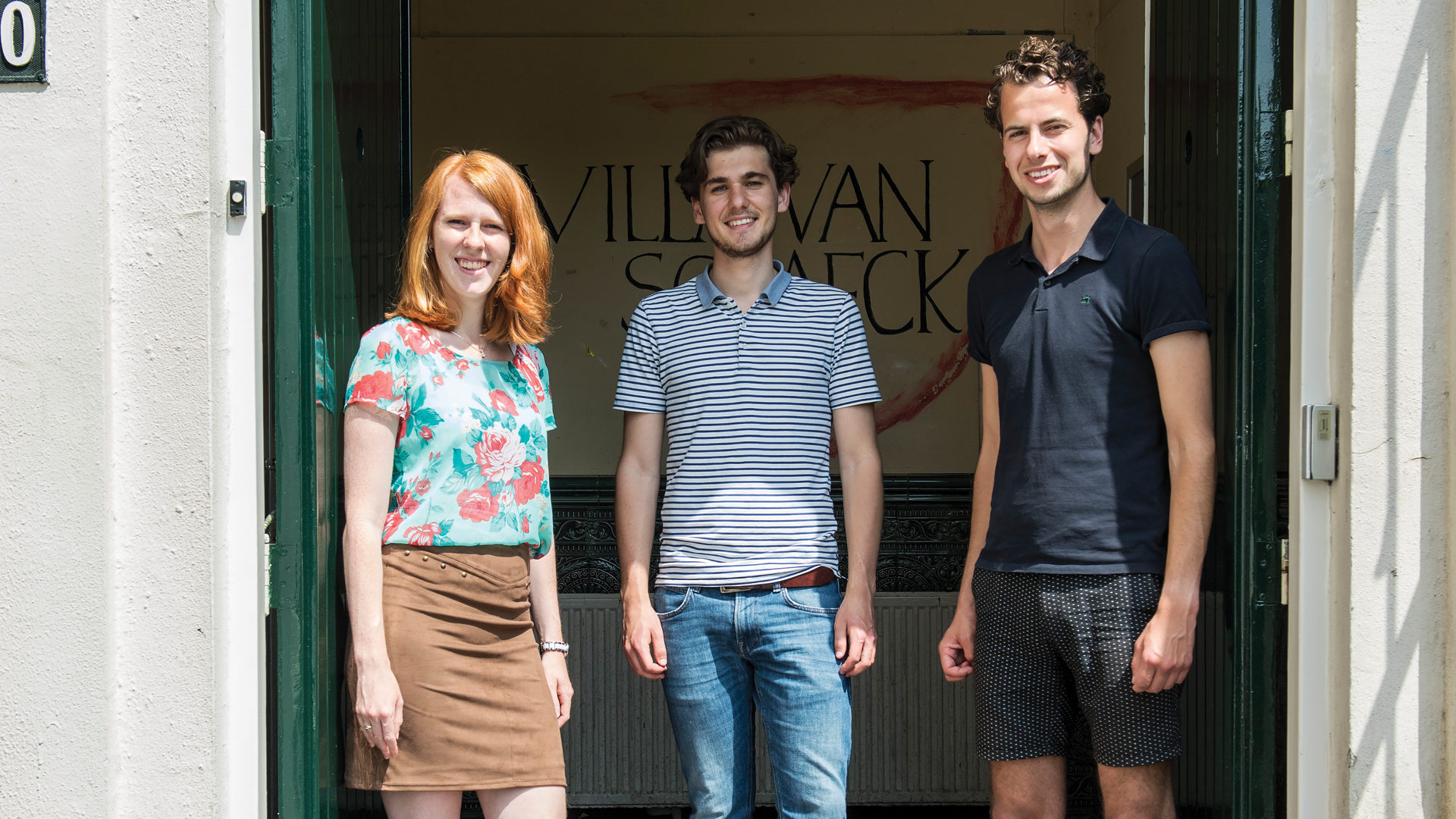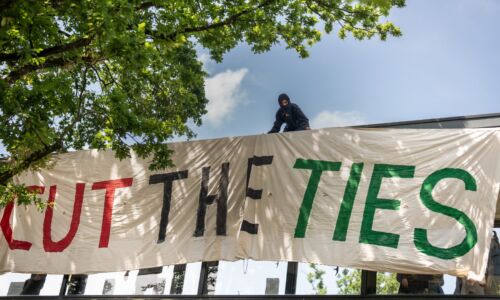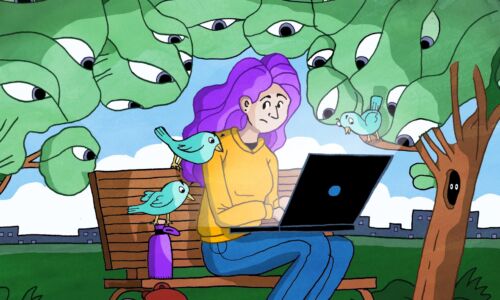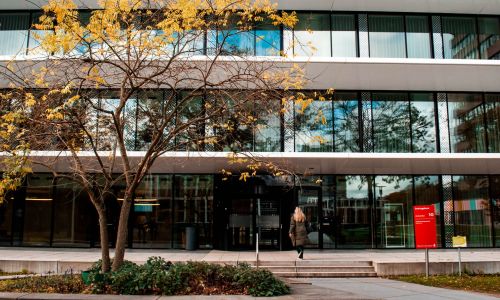Summer interview (4): the Navigators
Three students, members of the Christian student association the Navigators (NSN), died last year in an accident in the French Alps. They were buried in an avalanche. What kind of effect does this have on a student association? ‘There was complete solidarity.’
On the wall hangs a plaque with three names: Marcel, Mark and Timo. In the background the contours of a mountain ridge and a date: 7 March 2017.
‘It was a conscious choice not to add their photographs,’ says Tessa Katerberg. ‘It was really traumatising, and it would be too confrontational to see their faces every time you enter the boardroom.’
Last year Tessa was a board member at the Christian student association NSN (Nijmegen Student Association the Navigators). She was the spokesperson at a press conference following the death by avalanche of three association members during a skiing trip in the French Alps.
‘I just wanted to be with friends who were in the same boat. To share how we felt’
For a long time, the students didn’t want to give any interviews. Now that a year has gone by, they’re ready to share what the accident did to their association. How it changed NSN, and how it changed them personally. How friendships deepened.
Journalist in the hall
Tuesday 7 March 2017. The NSN board is at a party organised by a fellow association in Rotterdam when they get a phone call from France. One of their members says something terrible has happened: three students wanted one last ride down the mountain on their snowboard. They went off-piste for a bit, and became disoriented due to sudden mist. An avalanche overtook them. Marcel was dead, the fate of Mark and Timo was as yet uncertain. ‘We could hardly take it in,’ remembers Public Administration student Tessa. ‘It was terribly sad. I still remember that we prayed together, over the telephone. We in Rotterdam, they in France.’ Together with the other board members, she decided to drive back to Nijmegen. ‘I was the designated driver. During the drive we were all silent. We only got home around 3 a.m. We decided to meet the next morning at 11. Too late, as it turned out, but we didn’t know that at the time.’
On the morning of 8 March, at 8 a.m., a news report is broadcast about a student from Nijmegen dying in a skiing accident. When the first NSN members arrive at the white villa on the Van Schaeck Mathonsingel where the association is located, a journalist is waiting for them in the hall. Tessa: ‘We were completely taken by surprise. I still don’t understand how they were so quick to make the link with our association.’ Colleagues from neighbouring association Phocas are kind enough to escort the journalist off the premises, but it soon becomes clear that the Navigators are on the radar of pretty much the entire Dutch press. It’s not enough to inform their members, as media are already trying to reach them.
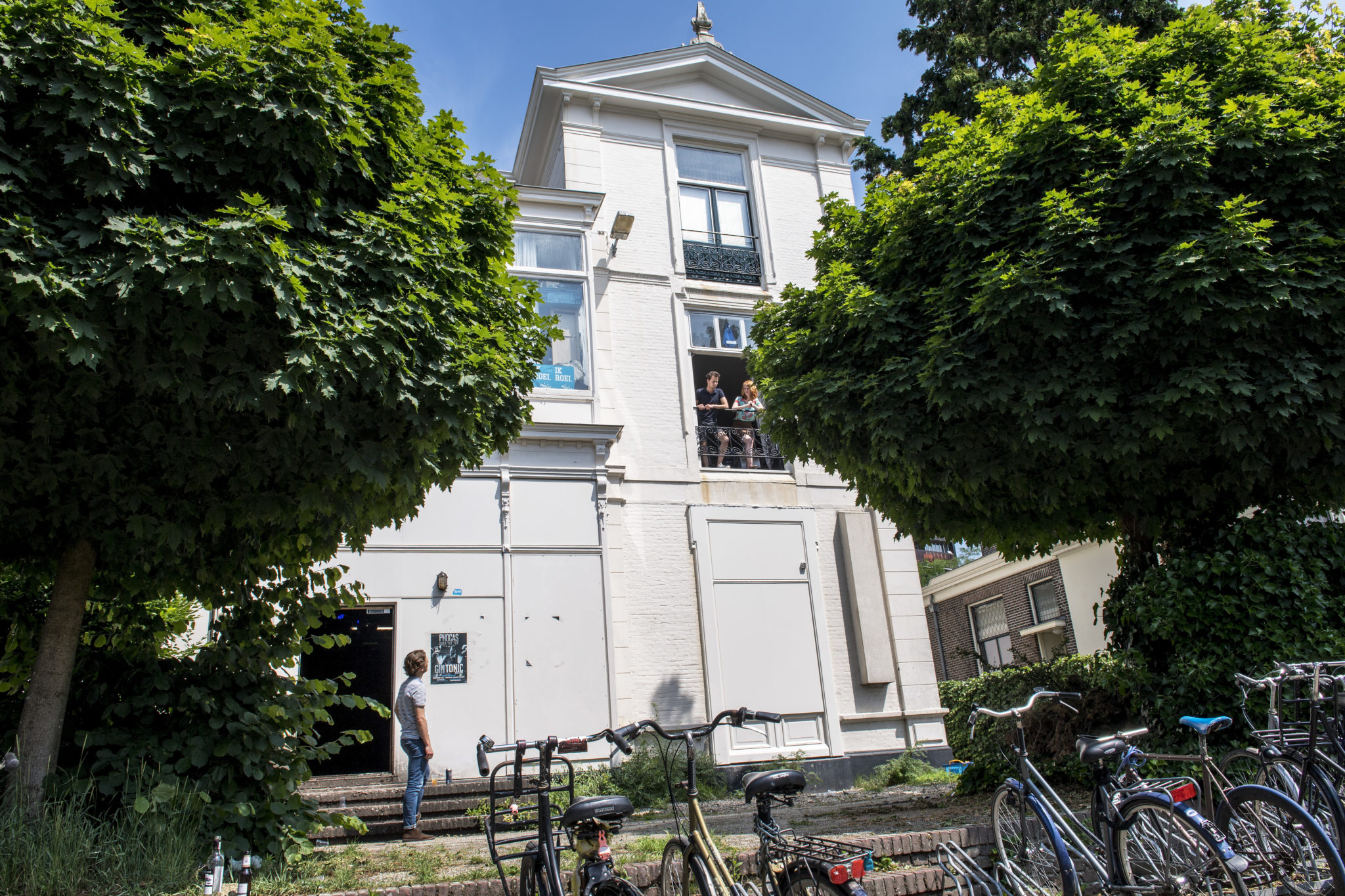
Tessa thinks she’s ‘slightly further removed’ from the victims than her fellow board members, so she offers to speak to the press. ‘Together with the University we decided to hold a press conference. Just tell our story once, and that’s it.’ The Radboud University communications officer helps her prepare. It’s a nerve-wrecking session, but also good in a way, as she remembers. ‘On a day like that, you really get into Do! mode. It’s nicer to be doing something concrete than to really let what happened sink in.’
It seems to work. The army of camera people at the door dwindles. Kevin van Huet Lindeman, faithful member of NSN, recalls how annoyed he was with the media that day. Members who came to the villa would get microphones pushed into their faces. ‘You’d hear statements in the news like ‘students are coming together to cry and support each another’. What were we supposed to make of that? What was his point?’ It was also annoying how some of the information was plain wrong. Tessa: ‘They would mix up names and ages, for example.’
WhatsApp message
More importantly, NSN members had other things on their mind. They felt worried and dejected. Seventeen travel companions and fellow NSN members were still in the French Alps. Kevin: ‘The three students who died were very active members. They were really at the heart of our association.’ He was personally friends with two of them, and knew the third one quite well. He was working in Scherpenzeel when a housemate who’d gone along on the skiing trip called him with the bad news. ‘My father came to get me. He asked: ‘Do you want me to drive you home or to the association?’ I just wanted to be with friends who were in the same boat. To share how we felt.’
Hugo Bahlman was a second-year student in Law who’d only recently become a member of NSN. On Wednesday 8 March he was in a tutorial. ‘A friend of mine who was there too got a WhatsApp message. ‘It’s about an NSN member.’ The news became more and more concrete. After three quarters of an hour we left to go to the villa.’
The association building got busier and busier as the morning went on. Soon approximately 100 members were there, in Hugo’s estimate.
Tessa: ‘We opened the big hall downstairs.’
Hugo: ‘It was nice to be able to be together at such a difficult time.’
The rest of the day was chaotic, but members automatically slipped into the role that best suited them. Some poured coffee; others stirred big pots of soup in the kitchen. Board members received mourning protocol instructions from fellow associations. The website had to go black. ‘There was complete solidarity,’ remembers Tessa. ‘Usually association members just hang out with their own club or their own fraternity, but this went completely beyond that. There was unity. It was amazing to see how people just wanted to help and only thought of what they could do to be useful. We all took care of each other.’
At the villa the students prayed and in the evening they sang together. ‘That was really beautiful,’ says Tessa. ‘Singing brings you closer to God. Whether you feel very sad or only a little, it’s something you can share. Wednesday night is our regular association night and everyone was there –members and former members.’
NSN is a Christian association. What’s the role of faith at times like this?
Tessa: ‘As board members, we found a lot of comfort in prayer – I don’t know how to explain it. You simply know that there are lots of people empathising and praying for you, and this gives you strength in a way, it helps you to keep going. We received so many cards from people – just random people – who wrote ‘we were in Valfréjus two weeks ago, we have such nice memories of our stay, and we’re praying for you’.’
Hugo: ‘It makes me feel proud to believe that there is a God up there. When you wonder why this accident happened – What was the point? – it gives me peace to think that God takes care of us. At the time I often prayed with others. Just for a bit, to seek support and hope in God. That’s the power of prayer.’
Kevin: ‘I don’t believe this was God’s plan, but I do believe He was a witness. He was there with those boys, and He was here with us. I recognise the feeling of being carried, even though it’s still a bit vague. I had doubts. If God was almighty, why didn’t He stop this from happening? But I was really happy to see that my questions were also welcome. We could lean on each other.’
Did the accident erode your trust in God?
Tessa: ‘It didn’t for me. I don’t know why, but I was able to put the ‘why’ question aside, because I knew I would probably never know the answer.’
Kevin: ‘It did for me. I’m not yet sure what to do with it, it’s a process I’m going through. I don’t know whether I’ll ever find an answer, it’s a question of learning to trust God once again. But although I don’t understand it, I do feel that there’s consolation to be found in it. I don’t want to let go of my faith in God, because it’s the only thing that gives me hope.’
Hugo: ‘I’ve had moments of doubt, but I leaned on the people around me. The fiancée of one of the victims was in my fraternity and I felt that she remained very close to God. I didn’t see her getting angry. That was when I thought: Why should I be angry?’
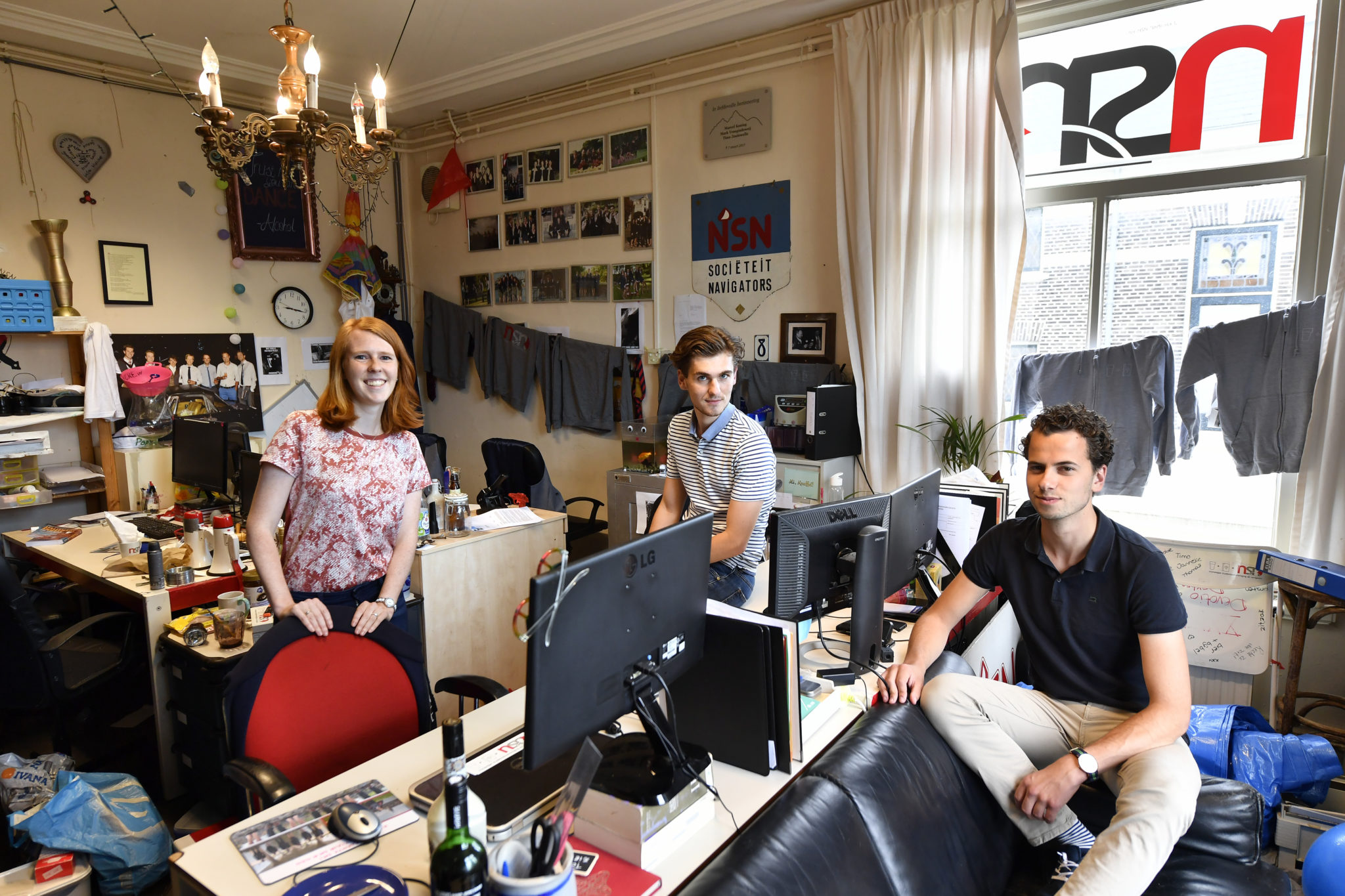
Together on the bus
The accident was soon followed by three funerals. Or rather: two funerals and one memorial service, since one of the bodies had not yet been found. It was only after the Alp snow melted that an avalanche dog found Mark’s body, on 19 March. Tessa and Kevin attended all three services. The University organised a bus to drive them to the second funeral. ‘This may sound crazy, but it was kind of cosy,’ says Tessa. ‘To be together on that bus.’
Kevin: ‘Well, we saw a lot of each other that month.’
Friendships deepen when you go through something traumatic. And all three believe this to be a permanent effect.
‘It’s the end of a carefree existence’
Hugo: ‘As a first-year member I wasn’t yet very serious about the association, but an event like this really stops you in your tracks. It creates connections with people you might otherwise not have had.’
Kevin was afraid that first-year members wouldn’t be able to enjoy the kind of carefree first year he’d had. Alongside his sadness about the death of Marcel, Mark and Timo he also found this thought very painful. Hugo reassures him: it all turned out fine. ‘I definitely had a different first year than those who came before me, but not necessarily a worse one. I’ve seen the association at its closest, and I got real friendships in return.’
Some NSN members sought professional help to deal with their sadness, others suffered some delay in their studies. Exactly six months after the avalanche the board hung up a plaque with the name of the victims in the boardroom. On 7 March 2018 a memorial service was held in the Boskapel: students once again took the time to remember the friends they had lost. This was probably the last ‘official’ moment organised by the board. Life goes on, members graduate, and in September a new generation of students will be welcomed. ‘And that’s a good thing,’ says Tessa.
Did the accident affect you personally?
Kevin: ‘It robbed me of my carefree attitude. I’m more aware of everything I do or say, as if everything is more meaningful now. At the time it could be very confusing. Now I would say: it made my life – and my faith – more real. But it took a while for normal pleasure to return.’
Hugo: ‘Yes, that’s it. It’s the end of a carefree existence.’
Tessa: ‘In the beginning I was a little anxious. It was so random: three healthy boys, and then just like that… It was the randomness of it being an avalanche. It meant anything could happen. When my boyfriend went out, I’d think: ‘I have to say good-bye properly’. But at some point I was able to let it go again.’
Kevin: ‘I still have that. When I spend the weekend with my parents or with friends, I take the time to say good-bye more consciously.’
Marcel, Mark and Timo commemorated
NSN is a Christian (formerly Protestant) student association with approximately two hundred members. On 7 March 2017, three of the association’s members died in an avalanche. During a skiing trip organised by the association, they went off-piste on their snowboards. The body of HAN University of Applied Sciences student Marcel Koning (22) was found first. He was followed by student of Business Administration Timo Zoutewelle (21). On 19 March, an avalanche dog tracked down the body of Business Administration alumnus Mark Vroegindeweij (25). A memorial place was set up at the Student Church, and another one in the association building on the Van Schaeck Mathonsingel. The villa that is home to NSN was open every night for a week. This was followed by a ‘sober month’ (no fraternity activities) and a number of commemorative moments were organised later in the year. A year later, the accident was remembered with a ‘sober week’ and a service in the Boskapel.
